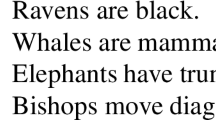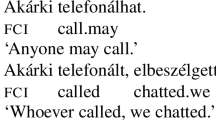Abstract
This paper discusses free-choice like effects in generics. Just as Jane may drink coffee or tea can be used to convey Jane may drink coffee and Jane may drink tea (she is “free to choose”), some generics with disjunctive predicates can be used to convey conjunctions of simpler generics: elephants live in Africa or Asia can be used to convey elephants live in Africa and elephants live in Asia. Investigating these logically slightly more complex generics and especially the free-choice like effects throws light on both the semantics of generics and the interaction between world knowledge and the interpretive options generics offer. This paper presents a package of semantic and pragmatic hypotheses to account for the data, including why the effect is absent in the superficially logically similar elephants live in Africa or give birth to live young.
Similar content being viewed by others
References
Alonso-Ovalle, L., (2005). Distributing the disjuncts over the modal space. In L. Bateman & C. Ussery (Eds.), Proceedings of the North East Linguistics Society (Vol. 35). Amherst, MA: GLSA. https://doi.org/www.alonso-ovalle.net/papers/alonso-ovalleNELS2005.pdf.
Asher N., Morreau M. (1995) What some generic sentences mean. In: Carlson G.N., Pelletier F.J. (eds) The generic book. University of Chicago Press, Chicago, pp 300–339
Barwise J. (1986) Conditionals and conditional information. In: Traugott E., ter Meulen A., Snitzer-Reilly J., Ferguson C. (eds) On conditionals. Cambridge University Press, Cambridge, pp 21–54
Beck S., Sauerland U. (2000) Cumulation is needed: A reply to Winter (2000). Natural Language Semantics 8(4): 349–371
Brisson C. (2003) Plurals, all, and the nonuniformity of collective predication. Linguistics and Philosophy 26(2): 129–184
Carlson, G. N. (1977). Reference to kinds in English. Ph.D. thesis, University of Massachusetts, Amherst.
Carlson G.N. (1995) Truth conditions of generic sentences: Two contrasting views. In: Carlson G.N., Pelletier F.J. (eds) The generic book. University of Chicago Press, Chicago, pp 224–237
Carlson G.N. (2002) A unified analysis of the English bare plural. In: Portner P., Partee B.H. (eds) Formal semantics: The essential readings. Blackwell Publishing, Malden, MA, pp 35–74
Chierchia G. (2002) Scalar implicature, polarity phenomena, and the syntax/pragmatics interface. In: Belletti A. (Ed.) Structures and beyond. Oxford University Press, Oxford, pp 39–103
Chierchia, G., Fox, D., & Spector, B. (2010). The grammatical view of scalar implicatures and the relationship between semantics and pragmatics. In Portner et al. (Ed.), Handbook of semantics. https://doi.org/semanticsarchive.net/Archive/WMzY2ZmY/CFSEmbeddedSIs.pdf (to appear)
Cohen A. (1999a) Generics, frequency adverbs, and probability. Linguistics and Philosophy 22: 221–253
Cohen A. (1999b) Think generic!. CSLI Publications, Stanford, CA
Cohen A. (2004) Generics and mental representation. Linguistics and Philosophy 27(5): 529–556
Eckardt R. (1999) Normal objects, normal worlds, and the meaning of generics. Journal of Semantics 16(3): 237–278
Fodor, J. D. (1970). The linguistic description of opaque contexts. Ph.D. thesis, MIT.
Fox D. (2007) Free choice and the theory of scalar implicatures. In: Sauerland U., Stateva P. (eds) Presupposition and implicature in compositional semantics. Palgrave Macmillan, Houndsmills, pp 71–120
Gerstner-Link, C. (1988). Über Generizität. Generische Nominalphrasen in singulären und generischen Aussagen. Ph.D. thesis, University of Munich.
Gillon B. (1987). The readings of plural noun phrases. Linguistics and Philosophy 10(2): 199–220
Gillon B. (1990) Plural noun phrases and their readings: A reply to Lasersohn. Linguistics and Philosophy 13(4): 477–485
Gillon B. (1992) Towards a common semantics for English count and mass nouns. Linguistics and Philosophy 15(6): 597–640
Greenberg Y. (2007) Exceptions to generics: Where vagueness, context dependence and modality interact. Journal of Semantics 24(2): 131–167
Greenhall O. (2008) Against Chierchia’s computational account of scalar implicatures. Proceedings of the Aristotelian Society 108(1 (pt. 3)): 373–384
Grice, H. (1991). Logic and conversation. In Studies in the ways of words (pp. 22–40). Cambridge: Harvard University Press.
Harnish R.M. (1991) Logical form and implicature. In: Davis S. (Ed.) Pragmatics: A reader. Oxford University Press, New York, pp 316–364
Heim, I. (1982). The semantics of definite and indefinite noun phrases. Ph.D. thesis, University of Massachusetts, Amherst.
Horn, L. R. (1972). On the semantic properties of logical operators in English. Ph.D. thesis, University of California, Los Angeles.
Kamp H. (1973) Free choice permission. Proceedings of the Aristotelian Society 74: 57–74
Kamp H. (1978) Semantics vs. pragmatics. In: Guenthner F., Schmidt S.J. (eds) Formal semantics and pragmatics for natural language. Reidel, Dordrecht, pp 255–287
Klinedinst, N. W. (2007). Plurality and possibility. Ph.D. thesis, University of California, Los Angeles.
Krifka M., Pelletier F.J., Carlson G.N., ter Meulen A., Chierchia G., Link G. (1995) Genericity: An introduction. In: Carlson G.N., Pelletier F.J. (eds) The generic book. University of Chicago Press, Chicago, pp 1–124
Lakoff G. (1972) Linguistics and natural logic. In: Davidson D., Harman G. (eds) Semantics of natural language. D. Reidel, Dordrecht
Landmann F. (2000) Events and plurality. Kluwer, Dordrecht
Lasersohn P. (1995) Plurality, conjunction, and events. Kluwer, Dordrecht
Liebesman, D. (forthcoming). Simple generics. Noŭs. https://doi.org/sites.google.com/site/davidliebesman/simplegenerics/SGsfinal3.doc?attredirects=0.
Little C.C. (1958) Coat color genes in rodents and carnivores. The Quarterly Review of Biology 33(2): 103–137
McCarthy J. (1980) Circumscription: Aform of non-monotonic reasoning. Artificial Intelligence 13(1–2): 27–39
McCarthy J. (1986) Applications of circumscription to formalizing common sense knowledge. Artificial Intelligence 28(1): 89–116
McKay T.J. (2006) Plural predication. Oxford University Press, Oxford
Nickel B. (2008) Generics and the ways of normality. Linguistics and Philosophy 31(6): 629–648
Nickel B. (2010a) Ceteris paribus laws: Genericity, and natural kinds. Philosophers’ Imprint 10(6): 1–25
Nickel B. (2010b) Generic comparisons. Journal of Semantics 27(2): 207–242
Parwise J., Perry J. (1983) Situations and attitudes. MIT Press, Cambridge, MA
Pietroski P.M. (2005) Events and semantic architecture. Oxford University Press, Oxford
Sag, I. A. (1976). Deletion and logical form. Ph.D. thesis, MIT.
Sauerland U. (2004) Scalar implicatures in complex sentences. Linguistics and Philosophy 27: 367–391
Schein B. (1993) Plurals and events. MIT Press, Cambridge, MA
Schubert, L. K., & Pelletier, F. J. (1989). Generically speaking, or, using discourse representation theory to interpret generics. In G. Chierchia, B. H. Partee, & R. Turner (Eds.), Properties, types, and meaning (Vol. II, pp. 193–268). Dordrecht: Kluwer.
Schwarzschild R. (1996) Pluralities. Kluwer, Dordrecht
Simons M. (2005) Dividing things up: The semantics of or and the modal/or interaction. Natural Language Semantics 13(3): 271–316
ter Meulen A. (1986) Generic information, conditional contexts, and constraints. In: Traugott E., ter Meulen A., Snitzer-Reilly J., Ferguson C. (eds) On conditionals. Cambridge University Press, Cambridge, pp 123–145
von Fintel K. (1997) Bare plurals, bare conditionals, and only. Journal of Semantics 14(1): 1–56
Wilkinson, K. (1991). Studies in the semantics of generic noun phrases. Ph.D. thesis, University of Massachusetts, Amherst.
Winter Y. (2000) Distributivity and dependency. Natural Language Semantics 8(4): 27–69
Zimmerman T.E. (2000) Free choice disjunction and epistemic possibility. Natural Language Semantics 8(4): 255–290
Author information
Authors and Affiliations
Corresponding author
Rights and permissions
About this article
Cite this article
Nickel, B. Generically free choice. Linguist and Philos 33, 479–512 (2010). https://doi.org/10.1007/s10988-011-9087-4
Published:
Issue Date:
DOI: https://doi.org/10.1007/s10988-011-9087-4




